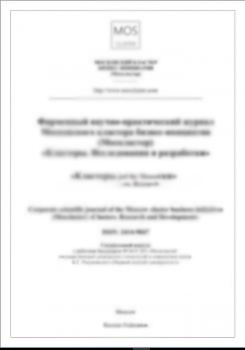Bryansk, Bryansk, Russian Federation
Bryansk clinical diagnostic center (Department of Statistic, Head)
Bryansk, Bryansk, Russian Federation
Bryansk, Bryansk, Russian Federation
50.07
3297
The relevance of the research is due to the complexity of the stage of exploratory data analysis and hypotheses for further verification by methods of statistical and/or data mining. Objective: to apply methods of visual analysis and cognitive visualization for exploratory analysis and advance preliminary hypotheses in the process of analyzing the dynamics of stillbirth of boys and girls in all areas of the Bryansk region with different density of radioactive contamination by long-lived radionuclides Cesium-137 (137Cs) and Strontium-90 ( 90Sr), on the basis of official statistics for the long-term period (1986-2016). Research methods: visual analytics and cognitive visualization, mathematical statistics: Shapiro-Wilk test, Student t-test, homoscedasticity test, linear regression. Research results: the research results confirm the feasibility of using methods of visual analytics and cognitive visualization for exploratory analysis and advancement of preliminary hypotheses. The use of cognitive visualization in the process of exploratory data analysis allows the researcher to better understand the main trends and patterns in the analyzed data. This makes it possible to reduce the time required to form hypotheses by two to three times and to improve the quality of the hypotheses put forward.
visual analytics, cognitive visualization, stillbirth rate, statistical data analysis, teratogenic impact, Chernobyldisaster, Bryansk region, radioactive contamination, 137Cs, 90Sr
1. Ashish K.C., Nelin V., Wrammert J. et al. Risk factors forantepartum stillbirth: a case-control study in Nepal // BMCPregnancy Childbirth. 2015 Jul 5; 15: 146. DOIhttps://doi.org/10.1186/s12884-015-0567-3.
2. BEIR VII Phase 2. 2006. Health Risks from Exposure to LowLevels of Ionizing Radiation: Committee to Assess HealthRisks from Exposure to Low Levels of Ionizing Radiation,National Research Council. The National Academies Press.2006. 423 p.
3. Data on radioactive contamination of the territory ofsettlements of the Russian Federation with Cesium-137,Strontium-90 and Plutonium-239+240 (edited by S.M.Vakulovsky). Obninsk, Scientific Production Association""Typhoon"", 2015, 225 p. (in Russian) Available by link:http://www.rpatyphoon.ru/upload/medialibrary/e38/ezheg_rzrf_2017.pdf.
4. Decree of the Government of the Russian Federation of10.08.2015 No. 1074. A list of settlements located withinthe boundaries of radioactively contaminated areasfollowing the accident at the Chernobyl nuclear power plant(in Russian) Available by link:http://legalacts.ru/doc/postanovlenie-pravitelstva-rf-ot08102015-n-1074/.
5. Facchinetti F., Alberico S., Benedetto C. et al. ItalianStillbirth Study Group: a multicenter, case-control study onrisk factors for antepartum stillbirth // J. Matern FetalNeonatal Med. 2011; Vol. 24, No. 3. R. 407-10. DOIhttps://doi.org/10.3109/14767058.2010.496880.
6. Getahun D., Ananth C.V., Kinzler W.L. Risk factors forantepartum and intrapartum stillbirth: a population-basedstudy // Am J Obstet Gynecol. 2007; 196 (6), pp. 499-507.DOI:https://doi.org/10.1016/j.ajog.2006.09.017.
7. Ghimire P.R., Agho K.E., Renzaho A. et al. Socio-economicpredictors of stillbirths in Nepal (2001-011) // PLoS One.2017 Jul 13; Vol. 12, No. 7: e0181332. DOIhttps://doi.org/10.1371/journal.pone.0181332. eCollection 2017.
8. ICRP. 2003. Dosimetric Significance of the ICRP’s UpdatedGuidance and Models (1989-2003) and Implications forU.S. Federal Guidance / edited by R. W. Leggett and K. F.Eckerman. Oak Ridge, Tennessee. 2003. 89 p.
9. Information on the level of stillbirths and population in theBryansk region and the Russian Federation from 1986 to2016 (agreement No. 65-arm). Bryansk: office of theFederal state statistics service for the Bryansk region, 2017.21 p. (in Russian).
10. Izraehl' Yu.A., Bogdevich I.M. Atlas of modern and forecastaspects of the consequences of the Chernobyl accident in theaffected areas of Russia and Belarus. Moscow-Minsk, 2009,140 p. (in Russian). Available by link:http://rb.mchs.gov.ru/upload/site1/document_file/oMqlw2bV2b.pdf.
11. Korsakov A.V., Hoffmann V., Pugach L.I., Lagerev D.G.Comparative analysis of the frequency of stillbirths in theradiation-contaminated areas of the Bryansk region after theChernobyl disaster (1986-2016) // Radiation biology.Radioecology. 2019; Vol. 59, No. 1, pp. 46-57. DOIhttps://doi.org/10.1134/S0869803119010053 (in Russian).
12. Salihu H.M., Wilson R.E., Alio A.P. et al. Advancedmaternal age and risk of antepartum and intrapartumstillbirth // J ObstetGynaecol Res. 2008; Vol. 34, No. 5, pp.843-50. DOI:https://doi.org/10.1111/j.1447-0756.2008.00855.x.
13. WHO statistics on the number of stillbirths in the world in2009. Available by link:http://www.who.int/reproductivehealth/topics/maternal_perinatal/stillbirth/Press_release_stillbirths_2011/en/
14. Yablokov A.V., Nesterenko V.B. Nesterenko A.V. et al.Chernobyl: consequences of the Disaster for human andnature (sixth edition, updated and revised). Moscow, 2016,826 p. (in Russian). Available by link:https://www.yabloko.ru/files/chern_8_vsya_kniga_25_marta.pdf.
15. Zakharova A., Shklyar, A. Basic principles of data visualmodels construction, by the example of interactive systemsfor 3D visualization (2014) Scientific Visualization, 6 (2),pp. 62-73.
16. Zakharova A.A., Shklyar A.V. Informative features of datavisualization tasks (2015) Scientific Visualization, 7 (2), pp.73-80.





